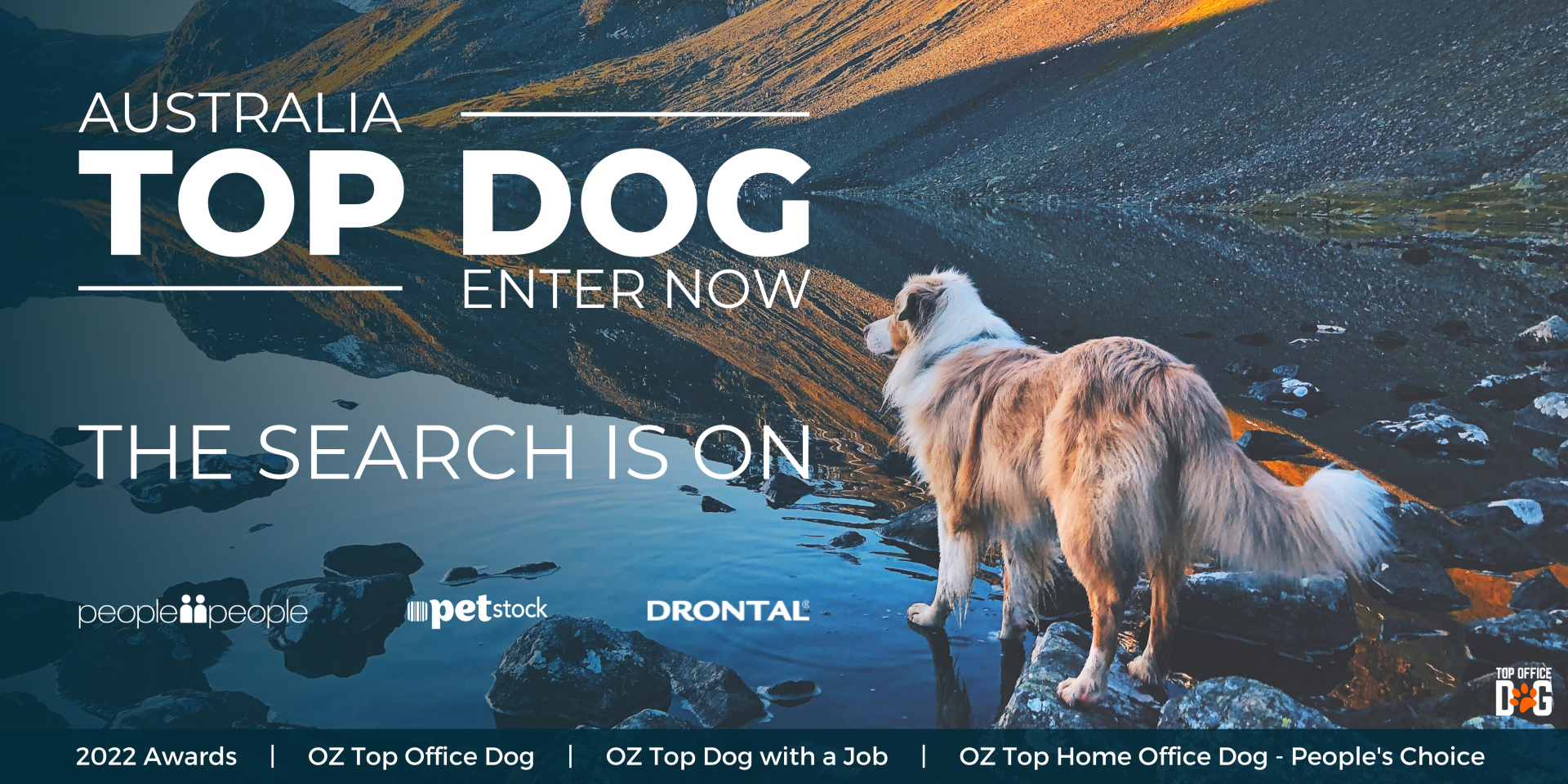5 ways dogs aid your mental and physical health
PETstock • September 12, 2022

Australia, the search is on.
For its 2nd consecutive year, people2people, along with our headline sponsor
PETstock, and new sponsor
DRONTAL, is proud to celebrate 2022 #OZTOPDOG. Enter your four legged best friend into our 3 prestigious awards categories: OZ Top Dog with a Job, OZ Top Office Dog, and OZ Top Home Office Dog (people's choice). Entries are open 29th August 2022 - 18th September 2022.
Get your dog in, enter now.
For dog lovers, it’s nothing new to hear that dogs are good for you. In our hearts, it’s just undeniable. However, it’s more than just a personal feeling because dogs have, and continue to be, proven good for your overall physical and mental health. In this article, we’re focussing on all the ways dogs can absolutely be the best medicine on tough days, weeks and months.
Here are five ways dogs aid your mental and physical health:
1) They make you run, walk, and climb (sometimes in the same session!)
Exercise can often be the hardest task to fit into our schedule. In most cases, it falls to the bottom of our list. However, when you’ve got a furry family member in your household, it’s simply not right to keep them from a daily outing or activity. Dogs need activity for both mental stimulation and physical health. Combine this, with all the human-related studies on exercise improving both your mental and physical health, such as lowering blood pressure and releasing endorphins; it’s basically a match made in heaven. If you do the right thing by your dog, you’re also doing the right thing by you. Take your dog out and about, to not only make them happy but also help you keep your own health in check. No doubt owning a dog provides more opportunity for us to engage in exercise.
“Dog owners are about four times more likely than other people to meet today’s physical activity guidelines, according to a large-scale new study of dogs and exercise,” – Gretchen Reynolds, The New York Times
Remember, it’s not just outside activity that can take your mind off your worries, or get your adrenaline pumping, it’s also incidental indoor exercise with your dog that can help your mental and physical health. This can include a bit of tug of war, recall training and throwing a ball - in a less fragile area of the home, of course.
2) They are good for the soul, development, and your mental health
We always knew dogs were good for the soul, but over time, society and many studies have proven that dogs are more than just quick comfort after a long day. Dogs can, and do, help provide mental health and developmental assistance every single day, in Australia, and all over the world.
Animal therapy dogs are a great example of how dogs bring hope, happiness and relief to humans who need it the most. An organisation like Assistance Dogs Australia, pair therapy dogs with humans suffering a range of issues, including PTSD. Andrew, who served in the military for fifteen years, was forced to retire due to PTSD mental health issues, but now he has Benji.
"He helps with Andrew’s anxieties of being out in public and has reduced his feelings of anger and aggression. The settling in period literally happened from the moment this bouncy ball of fur bounded through the front door. Andrew recalls: “When Benji arrived at our home, he was wagging his tail. My wife opened the front door to let us in, and from that moment on, he has been a part of our family. The assimilation was immediate, and he was welcomed with open arms by my children — they love him so much.” – Assistance Dogs Australia.
And it’s not just one story like this one; there are studies which have backed the benefits of dog companionship for many military veterans with PTSD. This kind of assistance also extends to the mental and developmental struggles of children who have difficulty reading. For some kids, having a dog and trained handler by their side makes a big difference to their anxiety symptoms.
3) They make you laugh out loud, and often
A laugh a day keeps the doctor away, and we all know dog owners get laughs-a-plenty from their loveable pooch. Dogs are a daily dose of entertainment for many of us, and that’s always, one hundred per cent, a good thing for our health. Whether that entails a game with your dog, training highlights or just silly interactions with your dog, there’s always a way dogs can make us laugh.
So, before you retreat back to television, radio or social media scrolling (although you’ll always find a cute dog to laugh at online too)consider thirty minutes of interaction and play with your dog – you’re bound to get just as much out of it as they do!
4) They provide a shoulder to lean on - always!
Dogs know us. They really know us. How we feel, and sometimes, we might suspect they know our thoughts – they certainly remember our actions. This means they can provide their own form of comfort to us, whenever we need it, even if we don’t know this ourselves.
“Dogs have also evolved to become acutely attuned to our behaviour, body language and emotions, so are very aware of our emotional states and are ready to respond with a gentle nudge or lick to help us during times of stress.” - Judith M. Siegel, Journal of Personality and Social Psychology.
These actions of love, comfort and companionship, can help us get through some of the toughest times. Whether we know it’s love or not, it doesn’t really matter. It feels like love, and that gives us everything we need. So, nurture these moments and exchanges with your beloved pup, they’re truly quite special.
5) They help give you a sense of purpose, routine, and stability
The fact that you care so much about your dog is a good thing when it comes to your mental health – and even your organisational skills.
"Caring for something provides meaning and purpose. The Japanese have a concept they refer to as Ikigai, which loosely translates as having a reason to get up and out of bed each day! More often, we refer to this as living a life of and/or with purpose and meaning. There’s no doubt this is extremely important for living a good life; and there’s no doubt that having something or someone to care for, like a pet, can provide a reason to get up and live,” – Lara Shannon, certified dog behaviourist and Pooches At Play host.
If you do feel that overpowering sense of purpose as a dog owner (which we hope you do!), then you’ll undoubtedly shift your own life to meet the day-to-day requirements of your pooch – meaning a solid routine of your own. It’s true that dogs love routine. It helps them feel safe, secure and content. This is also true for many humans. Being able to focus on a routine and schedule provides a similar sense of control and comfort, opposite to feelings of stress and anxiety - which can be attributed to a feeling of lack of control.
In short, a routine is good for us (or at least most of us), and we can thank our dogs for helping us feel the need to get our plans in order. They help us rise to the occasion.
If you didn’t believe it already, you can be certain that our dog companions are good for our overall mental and physical health. And we should definitely treat them as the special beings they truly are.
2022 OZTOPDOG - The search is on
This year, people2people is supporting the Petspiration Foundation.
Pets can improve people’s lives in so many ways.
The Petspiration Foundation strengthens the bond between pets and people. Making a positive impact today, and leading change for a better future.
To learn more about how you can help,
visit here.
Find the job you love I Find the right talent
Get in touch with people2people
Australia
I United Kingdom
In business since 2002 in Australia, NZ, and the United Kingdom, people2people is an award-winning recruitment agency with people at our heart. With over 12 offices, we specialise in accounting and finance, business support, education, executive, government, HR, legal, marketing and digital, property, sales, supply chain, and technology sectors. As the proud recipients of the 2024 Outstanding Large Agency and Excellence in Candidate Care Awards, we are dedicated to helping businesses achieve success through a people-first approach.
Recent articles









